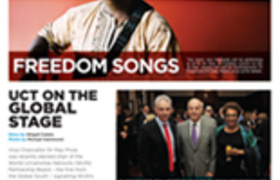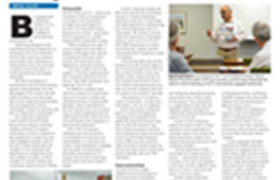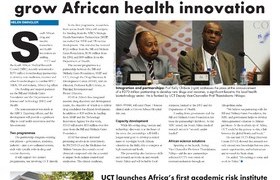A guide to the good life?
17 June 2014A life without happiness is not much of a life at all, and the best political systems ensure that their citizens can live a happy life.
So argued the Greek philosopher Aristotle, in his Nicomachean Ethics. Much of the book mulls over what 'happiness' actually means – is it pleasure, honour, health, justice? What combination of these is the ideal state for citizens of the state?
The very notion of 'citizen' at the time of the early Greek philosophers was far more exclusive than South Africa's Constitution holds: all were required to actively participate in one of the earliest forms of popular democracy known to humanity, but only a few were deemed capable of participating.
Scholars such as UCT's Professor Robert Mattes, of the Department of Political Studies and the Centre for Social Science Research (CSSR), study modern democratic systems and political culture as part of the continuing quest to develop a political system that serves everyone's needs.
Knowledge of how these systems work is crucial to making them work and to protecting people's rights, argues Mattes: "By developing greater cognitive awareness of its processes, through direct experience with the fruits of political performance and through national experiences with political competition, people learn both about the content of democracy as well as its consequences," he wrote in 2007.
South Africa's own post-apartheid dispensation might be democratic by definition, but many citizens still live in poverty, and inequality is as great as it is nearly anywhere else in the world.
Tackling socio-economic injustices
Universities' role in developing society was explicated by Emeritus Professor David Cooper, in his 2011 book
To this end, Professors Nicoli Nattrass and Jeremy Seekings, both of CSSR, have put much effort into unpacking the causes and effects of poverty and inequality (see the main body of Monday Monthly for a recent debate on that issue). As they argued in 2010, many of the institutional and structural features that shaped South Africa's apartheid-era growth path continue to do so in post-apartheid South Africa. These and other factors perpetuate poverty and inequality, they contend, despite the transition to democracy.
Performing identity
Social science students are exposed to a range of arguments about livelihoods, and the factors informing which people have what – and why.
The salient issues of racial, gender and class inequalities in South Africa are grappled with in the 'Race, Class and Gender' course available to undergraduate students in the faculty. The course work deconstructs these concepts in ways that question students' fundamental understanding and opens new possibilities for thinking about and 'performing' identity.
This performance – as academics such as former UCT sociologist Melissa Steyn argued in her book, Whiteness Just Isn't What It Used To Be – is often subconscious, but is informed by a range of external factors, and permeates every facet of life in the post-colonial and post-apartheid state.
While this is an appetiser to the work of the Faculty of Humanities, the common themes of the common good and social justice resonate throughout.
Story by Yusuf Omar.
 This work is licensed under a Creative Commons Attribution-NoDerivatives 4.0 International License.
This work is licensed under a Creative Commons Attribution-NoDerivatives 4.0 International License.
Please view the republishing articles page for more information.
News
Faculty Focus - Humanities
Opinions
Photo Essay
Front page
Previous Editions










